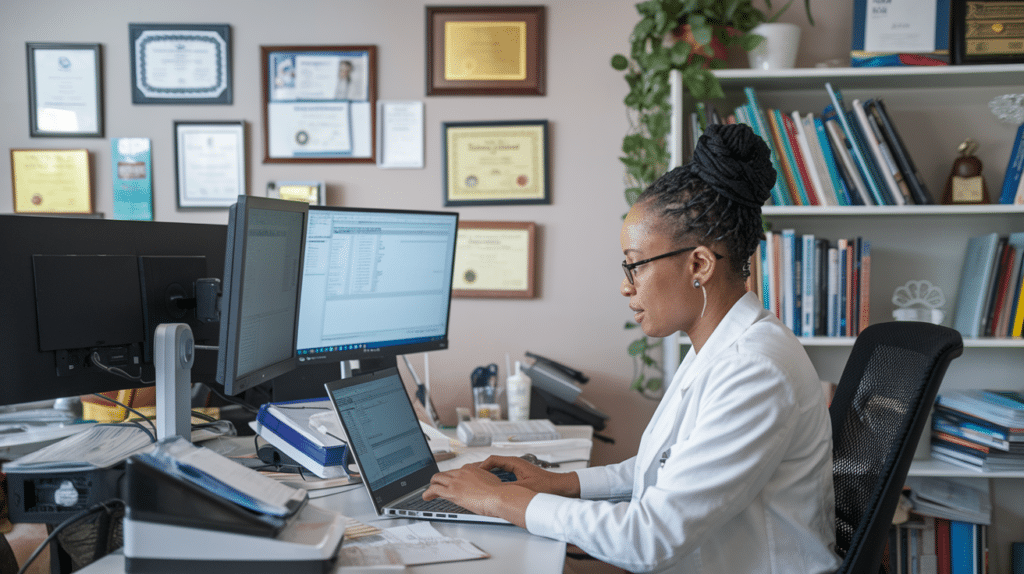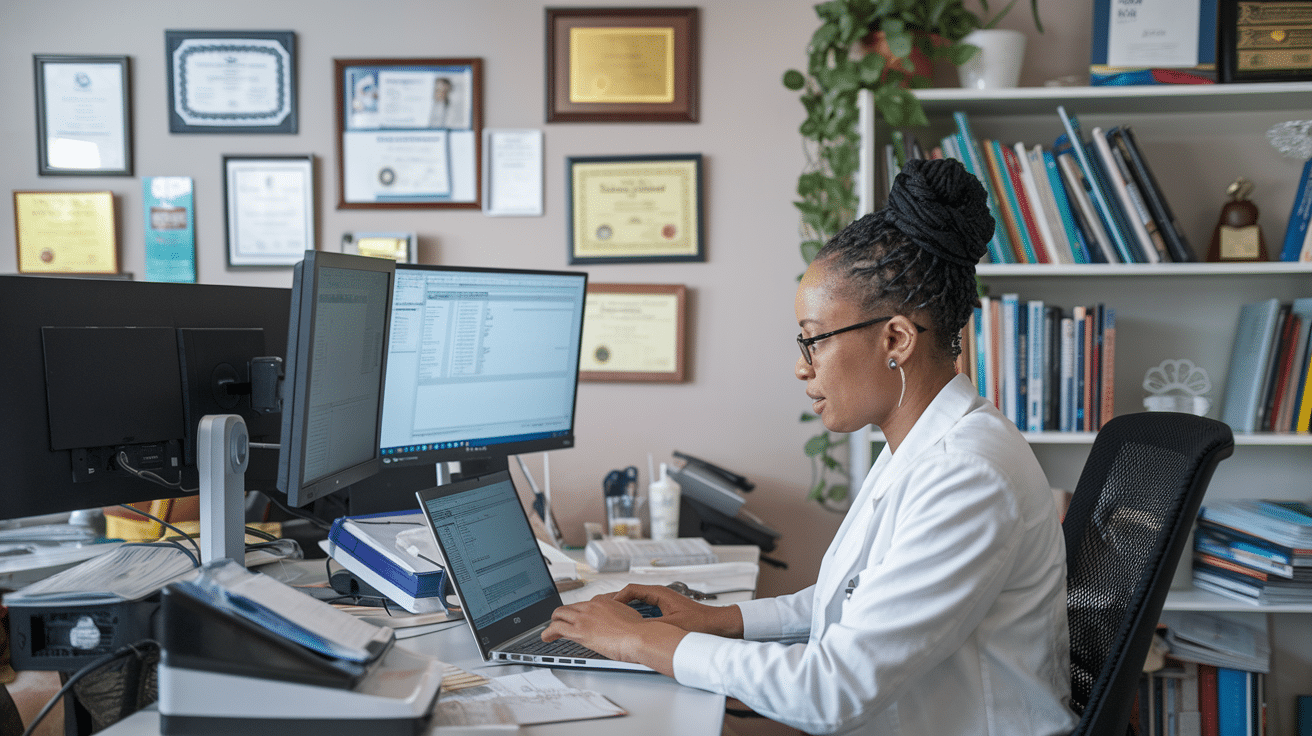Are you looking into entering the world of healthcare that doesn’t require years of medical school?
In the fast-paced world of healthcare, ensuring accurate documentation and smooth communication between patients and insurance providers is essential. Medical coders play an essential role in this process.
Medical coders act as translators, converting complex medical diagnoses, procedures, and treatments into standardized codes that ensure proper billing and recordkeeping.
This article aims to provide you with a detailed understanding of what medical coders do and the skills and qualifications needed to excel in this profession.
Let’s get started right away.

What Does a Medical Coder Do?
Medical coders are integral to the smooth functioning of healthcare organizations.
Their responsibilities typically go beyond data entry—they are responsible for ensuring precision, compliance, and effective communication across various stakeholders.
Let’s delve into some of the key duties that define a medical coder’s role:
Assigning Standardized Codes
The primary duty of a medical coder is to assign standardized codes to medical diagnoses, procedures, and treatments using systems such as ICD-10-CM, CPT, and HCPCS.
This process involves reviewing patient records and clinical documentation to extract the relevant information required for accurate coding. By translating these details into universal codes, medical coders help facilitate seamless billing and insurance claims.
Ensuring Compliance
Compliance is another important aspect of a medical coder’s job. Medical coders must adhere to strict healthcare regulations, payer policies, and coding standards to avoid errors and audits.
They often collaborate with physicians, nurses, and billing teams to clarify documentation and ensure that the information aligns with coding requirements.
Submitting and Reviewing Insurance Claims
In addition to coding, medical coders are involved in submitting claims for reimbursement. They prepare and review these claims to ensure they meet payer specifications, reducing the likelihood of denials.
When discrepancies arise, coders play an important role in identifying and correcting coding issues, ensuring that claims are processed efficiently.
Protecting Patient Confidentiality
Maintaining confidentiality is an essential part of the job, as medical billers and coders handle sensitive patient information.
Adhering to HIPAA regulations, they also typically safeguard data while ensuring that it is used appropriately for billing and reporting purposes.
Quality Control and Auditing
Some medical coders also specialize in auditing and quality control.
They review coded records for accuracy, identify patterns of errors, and implement strategies to improve overall documentation and coding practices within their organization.
Staying Updated
Staying updated on the latest changes in coding systems and healthcare regulations is crucial to maintaining accuracy and compliance in their work.
This requires continuous learning and professional development to stay ahead in the field.

Top Medical Coder Skills
Every profession has a certain set of knowledge and skills that a candidate should ideally possess to become successful and stand out in the eyes of the employer.
Similarly, every successful medical coder shares a set of critical skills that enable them to perform their job effectively.
These skills are not just technical but also reflect the ability to adapt and work efficiently in a demanding environment.
Let’s look at the top skills that employers usually look for in a medical coder:
Attention to Detail
Accuracy is one of the most important elements in medical coding. A single incorrect code can lead to claim denials or compliance issues, which is why medical coders must meticulously analyze every detail in patient records.
Knowledge of Medical Terminology
Understanding medical language, including anatomy, physiology, and common healthcare procedures, helps coders accurately interpret clinical documentation.
Analytical Thinking
Medical coders need to analyze complex medical data and translate it into standardized codes while ensuring compliance with coding guidelines.
Technical Proficiency
Medical coders should be familiar with electronic health record (EHR) systems, coding software, and other healthcare technologies that are essential for managing and processing data efficiently.
Communication Skills
Effective communication with healthcare professionals is also essential, especially when clarifying ambiguous or incomplete documentation.
Adaptability
The healthcare industry is constantly evolving. Coders must stay updated on regulatory changes, new coding standards, and emerging technologies to maintain their effectiveness.
Problem-Solving & Time Management
Balancing multiple records, deadlines, and claim submissions requires strong organizational and time management skills.
From resolving claim denials to identifying documentation gaps, medical coders often need to troubleshoot issues that arise during their work.
3 Critical Elements Required to Become a Medical Coder
Now that you know everything about what medical coders do, and what skills you should possess to become one, let us walk you through the three major elements required to become one.
Here is a guide on what is required to become a medical coder:
1. Education:
The first step you should take while starting your medical coder journey is to get your high school diploma or a GED.
However, while some employers may accept a high school diploma combined with relevant experience, most positions typically require some sort of training in medical coding or healthcare administration.
Even though the traditional route, such as degree or certificate programs from on-campus college, has been a popular path, there are some cons attached to this path.
This typically includes expensive tuition fees, which could range from $10,000 to $40,000, which sometimes excludes other expenses such as the cost of living, commute to the classes, and so on.
For busy working adults with other commitments, accredited online programs can be a great starting point, which removes the typical hassles you would face via on-campus programs.
Learn More: Medical Billing and Coding Training
2. Certification:
Certifications like the Certified Professional Coder (CPC), offered by the AAPC, or Certified Billing and Coding Specialist (CBCS), offered by the NHA are often required by employers.
These credentials validate your expertise and enhance your job prospects. Employers particularly value certifications as they demonstrate a commitment to professionalism and proficiency in coding standards.
For entry-level medical coders, the CPC and CBCS certifications are the most common pathways.
However, initially, if you lack the two years of professional experience required by AAPC guidelines for full CPC certification, you earn the CPC-A (Apprentice) designation.
See: Medical Coding Certification
3. Experience:
While completing medical coding training and obtaining certification lay the groundwork for medical coding, real-world experience is also essential for refining your skills.
This can be gained through externship opportunities. Externships allow you to apply coding knowledge to actual patient records and clinical documentation.
This experience helps you develop accuracy and attention to detail, navigate real-world challenges like ambiguous documentation, and understand how coding systems are used in practice.
Employers highly value this practical experience, as it demonstrates your readiness for the job and sets you apart from candidates without experience.

Medical Coding FAQs
What types of codes do medical coders use?
Medical coders use a set of coding systems regularly. They primarily use three coding systems: ICD-10-CM (International Classification of Diseases, 10th Revision, Clinical Modification) for diagnoses, CPT (Current Procedural Terminology) for procedures, and HCPCS (Healthcare Common Procedure Coding System) for other services and supplies.
Each of these systems has specific guidelines and codes that coders must follow to ensure accurate representation of medical services and treatments.
How does medical coding differ from medical billing?
While medical coding and medical billing are closely related, they have different responsibilities.
Medical coding involves translating patient care information into standardized codes, which are then used to generate insurance claims.
Medical billing, on the other hand, is the process of submitting those claims to insurance companies or other payers to receive reimbursement for healthcare services.
Medical coders ensure that the codes are correct, while medical billers focus on the financial aspect, ensuring claims are paid.
Can medical coders work remotely?
Yes, a lot of medical coders usually have the opportunity to work from home, especially as healthcare organizations increasingly rely on electronic health records (EHR) and cloud-based coding software.
Remote work options have become more common, offering flexibility for coders.
However, coders working remotely must still adhere to strict confidentiality guidelines, ensuring that patient data is securely handled in compliance with HIPAA regulations.
What skills are most important for a medical coder to have?
Medical coders need a variety of technical and soft skills. Key skills include attention to detail, strong knowledge of medical terminology, analytical thinking, and technical proficiency with coding software and EHR systems.
Effective communication skills are also crucial, as coders often need to collaborate with healthcare providers to clarify documentation.
Additionally, adaptability and problem-solving abilities are important, as coders must keep up with changing regulations and resolve discrepancies in coding.
What certifications are required to become a medical coder?
Certification is generally highly valued by employers in the medical coding field.
The most common certifications are the Certified Professional Coder (CPC), offered by the AAPC, and the Certified Billing and Coding Specialist (CBCS), provided by the NHA.
These certifications demonstrate a coder’s expertise and proficiency in industry standards.
For those just starting out, the CPC certification is widely accepted, however, you will be awarded the CPC-A credential if you don’t fulfill the AAPC requirement of having 2 years of experience.
Read More:
- Medical Billing and Coding Classes Online
- 4 Week Online Course For Medical Coding and Billing
- How You Could Get a Medical Billing and Coding Certificate in 4 Months
- How Much Does a Medical Coder Make?
medical billing & coding





